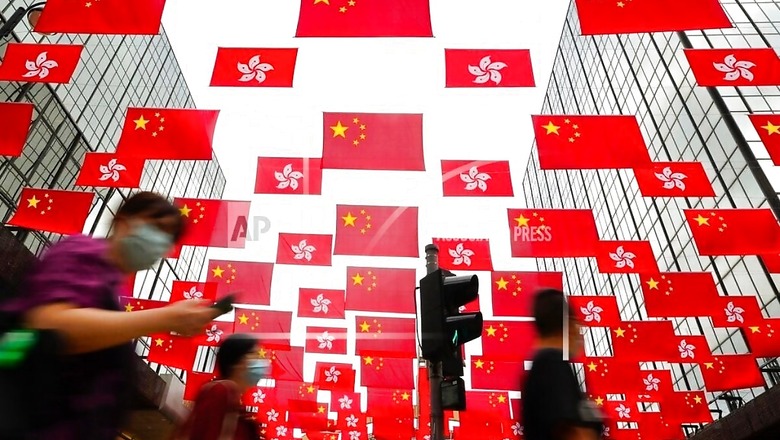
views
Last year, during the annual July 1 march protesting Hong Kong’s handover to China in 1997, thousands of Hong Kong residents came out in different parts of the island demanding greater democratic rights and raised voice against the increased Chinese suppression. This despite the fact that China had officially banned the march, citing the Covid-19 pandemic restrictions and imposition of a new controversial security law, known as the national security law (NSL).
Police had surrounded Victoria Park, the main protest venue in Hong Kong, but protesters, running in thousands, thronged the streets.
However, this year, China has cracked down heavily to stop any such large gathering, as the July 1 annual Hong Kong protest March day is also coinciding with the centenary celebrations of the Community Party of China (CPC). China has used NLS ruthlessly in the past one year to ensure that protesters do not swell out in large numbers this year. NSL was imposed on Hong Kong on June 30, 2020, just a day before the July 1 march last year and China started detaining and arresting protesters from the very next day.
Why Hong Kongers protest on July 1
The reason is Hong Kong going back to the Chinese rule. Most of the Hong-Kongers, who annually organised the June 4 vigil against the 1989 Tiananmen Massacre by China in Beijing, had protested against it. They had valid reasons. They were living in a free, democratic society — something that was unheard of in China — and that country was now directly going to rule them. Hong Kong was a British colony from 1842 to 1997.
The condition for reverting to the Chinese rule was that Hong Kong would follow a democratic model under ‘one nation, two systems’, known as the ‘Basic Law’ till 2047. The system meant no change in the lives of people of Hong Kong which was supposed to have a high degree of autonomy.
The condition was that China would not interfere in social and economic systems of the metropolitan area, which was also a special administrative region, and would not force its own laws to be imposed there that would be conflicting to the setup being already followed there. Religious rights, freedom of expression, open internet and right to speech and assembly with a free press, something that China doesn’t allow, were part of the Sino-British joint declaration for Hong Kong. The Basic Law also added that China could not stifle expression of dissent in Hong Kong.
At least till 2047.
Protesters read the Chinese designs right
China, with takeover, started making moves to make the systems prevailing in Hong Kong toeing the line taken in mainland China – total surrender, no democracy, no civil rights and no independent judiciary. Complete Chinese takeover of Hong Kong took just 23 years, even if the prevailing British system was supposed to last for 50 years, till 2047. The final outcome in Hong Kong says the protesters were right from the day one.
Since the 1997 handover, an expansionist China started violating the conditions set in the transfer protocol. It chose a Shanghai-born businessman to run Hong Kong. The first major Chinese move came just six years later. In 2003, China tried to impose NSL for the first time but was forced to withdraw it after Hong Kong witnessed large-scale protests across the region against it. In 2012, it tried to impose what it called patriotic classes. It led to student protests that was soon joined by other Hong Kongers till the move was scrapped.
On demand of universal suffrage as promised, China, in 2007, said that people of Hong Kong would be able to elect their leaders only by 2017 and legislators only by 2020 but ruled out any democratic election in Hong Kong in 2014. Also, voters’ choice in electing the Hong Kong’s leader was also eliminated. China said only Beijing-approved candidate would serve as the Hong Kong leader. Hong Kong law a large scale protest against this decision resulting in the rise of the ‘Umbrella Movement’. Hong Kongers were on streets for 11 weeks in 2014 demanding its repeal.
In 2016, China disqualified many pro-democracy activists from the legislative council election controlled by China. Also some pro-independence legislators were removed from their offices.
Xi Jinping in Hong Kong in 2017
Xi Jinping visited Hong Kong in 2017, to tell Hong Kong residents to toe the China line. He said Hong Kongers should not cross the ‘red line’ and challenge China’s sovereignty. He targeted Hong Kong’s protests that he saw as a conflict. It was a clear message to silence the pro-democracy activists and lawmakers there.
Hong Kongers demand free elections. China can’t hear anything negative on Tiananmen protests, that in 1989, that as per UK cables, saw around 10,000 pro-democracy activists killed by the People’s Liberation Army (PLA) in Beijing but people of Hong Kong have been organising annual vigils since 1990 to commemorate the victims.
Police didn’t permit the vigils in 2020 and 2021, obviously in the name of pandemic restrictions, but in the guise of it, started a ruthless crackdown since last year and activists feel that, with NSL becoming operational now, the annual June 4 vigil will soon be completely outlawed. In 2020, Hong Kong’s Victoria Park, the main venue for June 4 vigil was, was completely surrounded by the police. In fact, the whole Hong Kong saw massive policy deployment but protesters defied it, coming out in the streets holding electronic candles. But police were able to prevent mass commemoration this year.
In 2019, China introduced an extradition bill that allowed transfer of wanted persons from Hong Kong to mainland China to face trials there. It openly violated the ‘one country, two systems’ norms put in place. Pro-democracy activists saw it as a tool to transfer their cases to mainland China. Hong Kong administration was later forced to kill it in October 2019 after Hong Kong saw one of the largest anti-China protests in the history. More than one million people participated, one of the largest protests Hong Kong had ever seen.
But next year, Xi Jinping forcefully imposed NSL, after 17 years of its first introduction in 2003 and its implementation finally killed the ‘one country, two systems’ concept in reality. As is the case with any Chinese move, the NSL rules were completely shrouded in secrecy before their implementation, not even shared with China appointed Hong Kong leader. The move saw worldwide criticism with Britain and US even offered Hong Kongers route to citizenship and protection if they decided to leave Hong Kong.
Now with the law imposed, combined with the guise of Covid-19 restrictions in Hong Kong which has not seen any Covid case in the last six weeks, dissent is totally crushed there.
National Security Law
NSL is as draconian as the Chinese laws are on mainland China. An example to quote here is death of Peace Nobel Laureate Liu Xiaobo in a Chinese prison. He epitomized the non-violent struggle for fundamental rights in China. His demand for an end to the one-party rule in China put him in jail. China even opposed the decision to award Nobel Prize to him.
Crime of subversion under NSL means life imprisonment. Collusion with foreign forces under NSL means life imprisonment. If you damage public property, under NSL, it is terrorism. NSL means, if suspected, anyone can be put under surveillance, or more, can be wiretapped like it happens in Xinjian, an independent territory forcefully occupied by China. And it is applicable to both, individuals and organisations.
NSL means China’s own security office in Hong Kong, run by the people from the mainland China with power to shift the trial of the Hong Kong cases to mainland China.
Hong Kong was supposed to have Independent judiciary, unlike China, but cases now booked under NSL will be heard by the judges appointed China’s points-person in Hong Kong. Also, NSL means behind closed door trials.
Using NSL, China has arrested all leading pro-democracy protesters in China, i.e., entrepreneur and media tycoon Jimmy Lai, Benny Tai, Joshua Wong, Andy Li and many others. Around 1,000 activists have been detained and arrested with 117 under NSL only and they include students as well. Many pro-democracy leaders have been disqualified and removed from offices so far. Hong Kong was supposed to have a free press but Jimmy Lai’s ‘Next Digital’ that published pro-democracy newspaper Apple Daily will shut down its operations from July 1.
Also, the Civil Human Rights Front (CHRF), that has been regularly organising the July 1 march for many years, has been forced to cancel the July 1 event this year as its main convener, Figo Chan and farmer convener Jimmy Sham, are behind bars. China accuses CHRF of violating NSL, resulting in exodus of its members.
Violating NSL means detention and arrest and that, it seems, has significantly diluted democratic vibes in Hong Kong that was once one of the financial capitals of the world. Fearing NSL, 10,800 Hong Kong residents moved to Taiwan last year.
Read all the Latest News, Breaking News and Coronavirus News here.










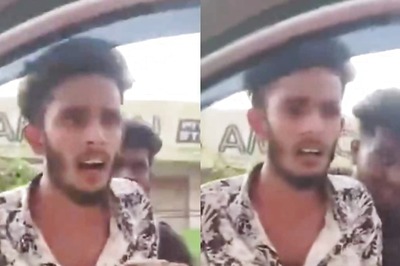


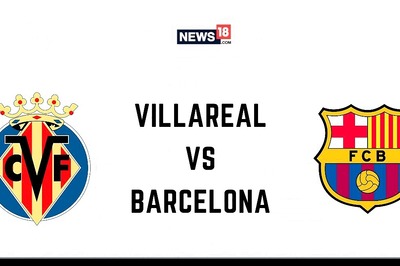
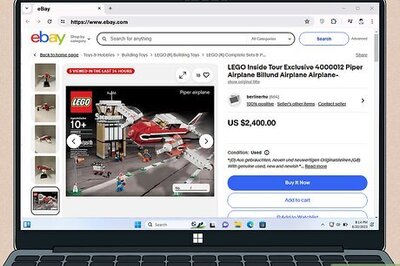
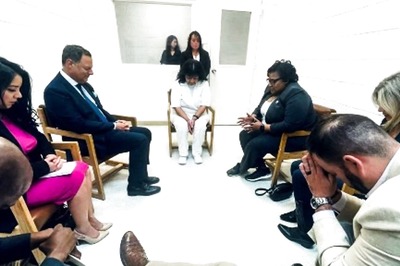

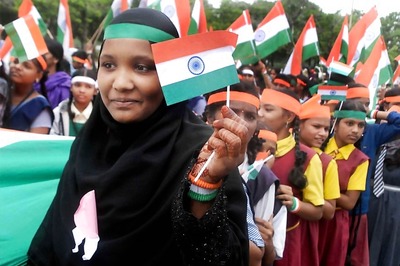
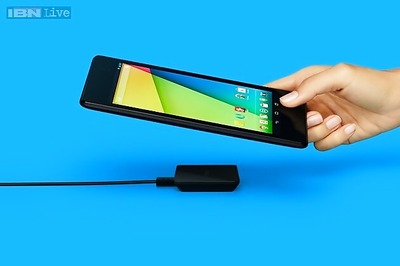
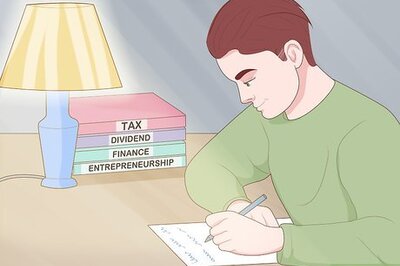
Comments
0 comment